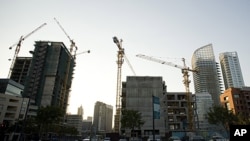Analysts say Lebanon's economy is resilient despite domestic political uncertainty as a new Hezbollah-controlled Cabinet begins to govern and several members of Hezbollah are accused in the killing of an ex-prime minister. But working class Lebanese are less sure. They are feeling the pinch in their pockets as prices rise and incomes do not.
The hum of hair dryers and buzz of chattering ladies is less than usual at Mitri Hasbani's hair salon in the Christian Achrafieh neighborhood of East Beirut.
Hasbani blames political uncertainty for the downturn in business, after it took Prime Minister Najib Mikati five months to form a Cabinet dominated by the political wing of Hezbollah, the Shi'ite militant group, and its allies.
“The business is not good, because you know first about the government, and the politics it is not stable,” said Hasbani.
The instability he is referring to is the political split over a United Nations Tribunal investigating the 2005 assassination of former Prime Minister Rafik Hariri. The Syrian- and Iranian-backed Hezbollah has vowed not to cooperate with the court, which it sees as a tool of the United States and Israel, while the opposition, led by Hariri's son Saad, supports the tribunal.
Around the corner at Eli Mitri's jewelry shop, where strands of turquoise and amber “worry beads” hang in the window, the economic slowdown is also being felt.
“The first and the initial reason, the [price of] gold is very high - the ounce of gold," said Mitri. "Then the people do not have extra reserve money to buy. You understand? And hoping the political situation will be better. If the political situation is cool, the work will go on. The Lebanese people like to live, like to spend, like to travel.”
Across town on West Beirut's bustling Hamra Street, hotel doorman Samer bemoans the rising cost of living.
“The rent of the apartments gets high, the gasoline gets high," he said. "Everything is getting higher day-by-day and the government is not doing anything or any issue about these things. When the government came, the Mikati government came, she said our premium work will be to stand with the people. Where is that?”
The new Cabinet led by Prime Minister Mikati and composed of Hezbollah and its allies has just begun its work, but it has several challenges ahead. The public debt is nearly $53 billion and the deficit is up 41 percent since January.
Marwan Barakat, chief economist at Lebanon's largest bank, Bank Audi, says citizens are suffering because real growth has declined in the first part of this year.
“This is due to the fact that the overall domestic political environment and the regional turmoil has left a burden on consumption and investment spending in Lebanon, and accordingly on growth - which affects ultimately the income of people. So it is a year of sluggishness,” said Barakat.
He says the International Monetary Fund has forecast a growth rate of only 2.5 percent for Lebanon this year, down from the 7.5 and eight percent annual growth the country has seen for the last three or four years.
But Barakat says Lebanon has entered this period of regional uprisings and its own domestic political dramas in a relatively strong economic position to weather a slowdown.
“The fact that we were in such a good position means that the pressures are more economic pressures much more than monetary and financial pressures," he said. "We do not have monetary and financial pressures because of those buffers. We are not afraid about the stability of the exchange rate of the Lebanese Lira for example. We are not afraid of outflows of capital from the Lebanese market. We are not afraid of a debt default on behalf of the state.”
American University in Beirut Economics Professor Samir Makdissi agrees that the Lebanese economy is resilient, but he cautions that if the issue of cooperation with the U.N. Tribunal is not resolved, it could negatively impact the economy and growth if Lebanon becomes isolated.
“But that [resiliency] does not resolve the problem of the people who are hurting," Makdissi. "They are going to keep on hurting till something drastic and basic takes place. And that is very much related to our political developments here. To be able to have basic changes in economic policy and otherwise, if you want to take hold, grip of your fiscal issues, you need political stability.”
The analysts say the new government has its work cut out for it in terms of reducing the debt, creating jobs and stimulating growth.
Some Lebanese are too impatient to wait and see if the government succeeds or fails. Taxi company owner Ghassan says he is fed up and would like to leave Lebanon. He says he sees no future here and would prefer to work, even as a manual laborer, in Europe or the United States.
Working Lebanese Say Political Uncertainty Bad for Business




